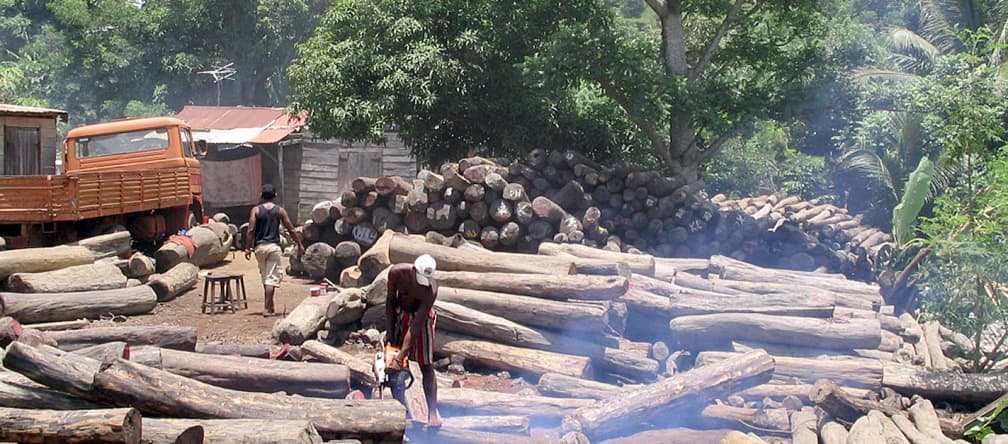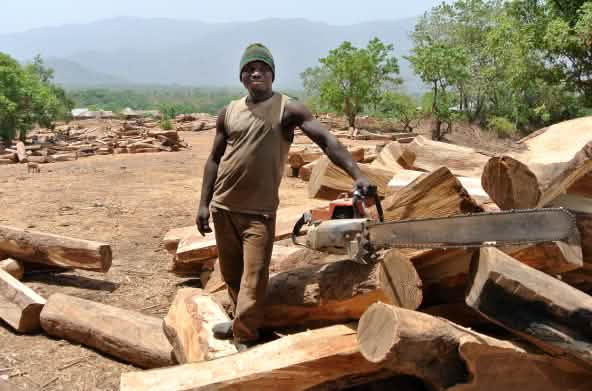
Completed campaign
A Guitar manufacturer strikes the wrong chord
John Lennon, Paul McCartney, Jimi Hendrix and Frank Zappa – many rock stars have added to the fame of Gibson guitars. In building these instruments, tropical hardwoods play a prominent role. Musicians have to pay several thousand euros for one of these quality pieces. However, the customers are unaware of this: Some of the timber comes from illegal sources in Madagascar and India. It is supplied by companies that clear the rainforest for this purpose.
On August 24th, the United States Fish and Wildlife Service, a federal government agency, raided Gibson guitar’s offices and factories in Nashville and Memphis – for the second time in a two-year period. The federal authorities confiscated guitars made of tropical hardwoods, pallets of wood from endangered trees and delivery documents. Gibson is accused of having twelve deliveries of ebony and rosewood illegally imported from India in the course of two years. In November 2009, federal agents had already paid Gibson a visit and their search had been a success: Back then, Gibson had imported illegally logged rosewood from Madagascar.
Apart from its factories in the United States, the Gibson group manufactures guitars in China as well. The biggest part of the timber illegally logged in Madagascar is shipped to the Asian country.
Please sign our letter to Gibson and make the company replace imported exotic wood with local timber species.
The raids are justified by means of the so-called Lacey Act. This American conservation law protects trade in wildlife, plants and wood: The articles of trade have to come from legal sources. In the case of timber imports from Madagascar, the investigative authorities were supported by human rights organisations Global Witness and Environmental Investigation Agency (EIA). Commissioned by the administration of the Malagasy national parks and financed by the German Kreditanstalt für Wiederaufbau (meaning Reconstruction Credit Institute), the investigators uncovered the obscure supply relationships for illegal tropical timber on the island. See the Study of the international trade in ebony and rosewood for asummary of the results.
For years now, the forests on the island are being looted on behalf of an unscrupulous timber mafia, including the Société Thunam Roger. Even protected areas like the Masoala National Park are not spared. Hundreds of containers filled with endangered and rare ebony and rosewood pile up in warehouses and ports, ready for shipping. And timber merchant Theodor Nagel from Hamburg is part of the game. For years, Gibson allegedly purchased tons of Malagasy ebony wood from Nagel who shipped the stolen timber to the United States.
In the ongoing investigation, the Forest Stewardship Council (FSC) also becomes a target of criticism. The organisation located in Bonn, Germany, affixes its label to timber coming from “responsible forest management”. But in fact, the FSC is dominated by the timber industry which results in lax standards, regular cases of fraud and scandalous certifications. Even the Gibson group probably owes its five FSC-labels to its close connection to the FSC and to the Rainforest Alliance. GibsonCEO Henry Juszkiewicz formerly served on the New York City-based RainforestAlliance’s board of directors: The organisation’s SmartWood program is accredited toaward the FSC-label. The press release by Juszkiewicz reads: “Agents seized woodthat was Forest Stewardship Council controlled. (...) The wood seized on August 24th satisfied FSC standards.” Rainforest Rescue has been accusing the FSC of falselabelling for a long time.
Gibson Guitar Corp.
Mr. Henry Juszkiewicz, CEO
309 Plus Park Blvd.
Nashville, TN 37217, USA
Tel.: 1-800-444-2766
henry.juszkiewicz@gibson.com
Dear Mr. Juszkiewicz,
we are outraged that your company is suspected of importing exotic timber from illegal sources for the second time now.
In November 2009 and again in August 2011, agents of the American federal government agency U.S. Fish and Wildlife Service have confiscated tropical timber, guitars and delivery documents at the Gibson offices. Gibson is accused of unlawfully importing precious ebony and rosewood from Madagascar and India.
We think it is unacceptable that you not only ignore the Indian export laws for timber, but also criticize them in public, because they stand in the way of your business dealings.
The illegal trade in tropical timber is the main cause of the destruction of the rainforest. The resulting damage on man and nature is enormous. Especially in Madagascar, the situation is dramatic: Even protected areas like the Masoala National Park are looted for the purpose of obtaining ebony and rosewood for export.
For decades, environmental organisations around the world have fought for the import of illegal timber to be stopped. In the United States, this resulted in the amendment of the Lacey Act in 2008. The Lacey Act prohibits trade in wildlife, plants and wood from illegal sources. Furthermore, the European Union decided to impose a ban on the import of illegal timber in 2010 (Timber Regulation (EU) No. 995/2010 of the European Parliament).
These laws constitute an important step in curbing the destruction of our rainforests. We are certain that no musician is going to buy a Gibson guitar or play it, if building it involves forest clearance, illegal sources and unlawful imports.
Tropical timber is not a crucial factor in terms of the sound of electric guitars. Please use local wood from sustainable forest management instead. North America alone has 240 different tree species. Put a stop to imports of tropical wood from Madagascar, India and other countries.
Respectfully,

